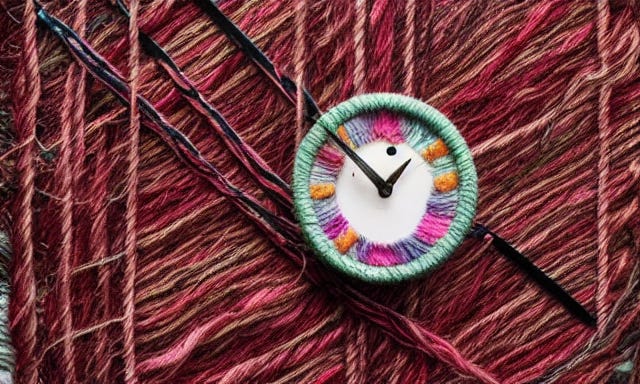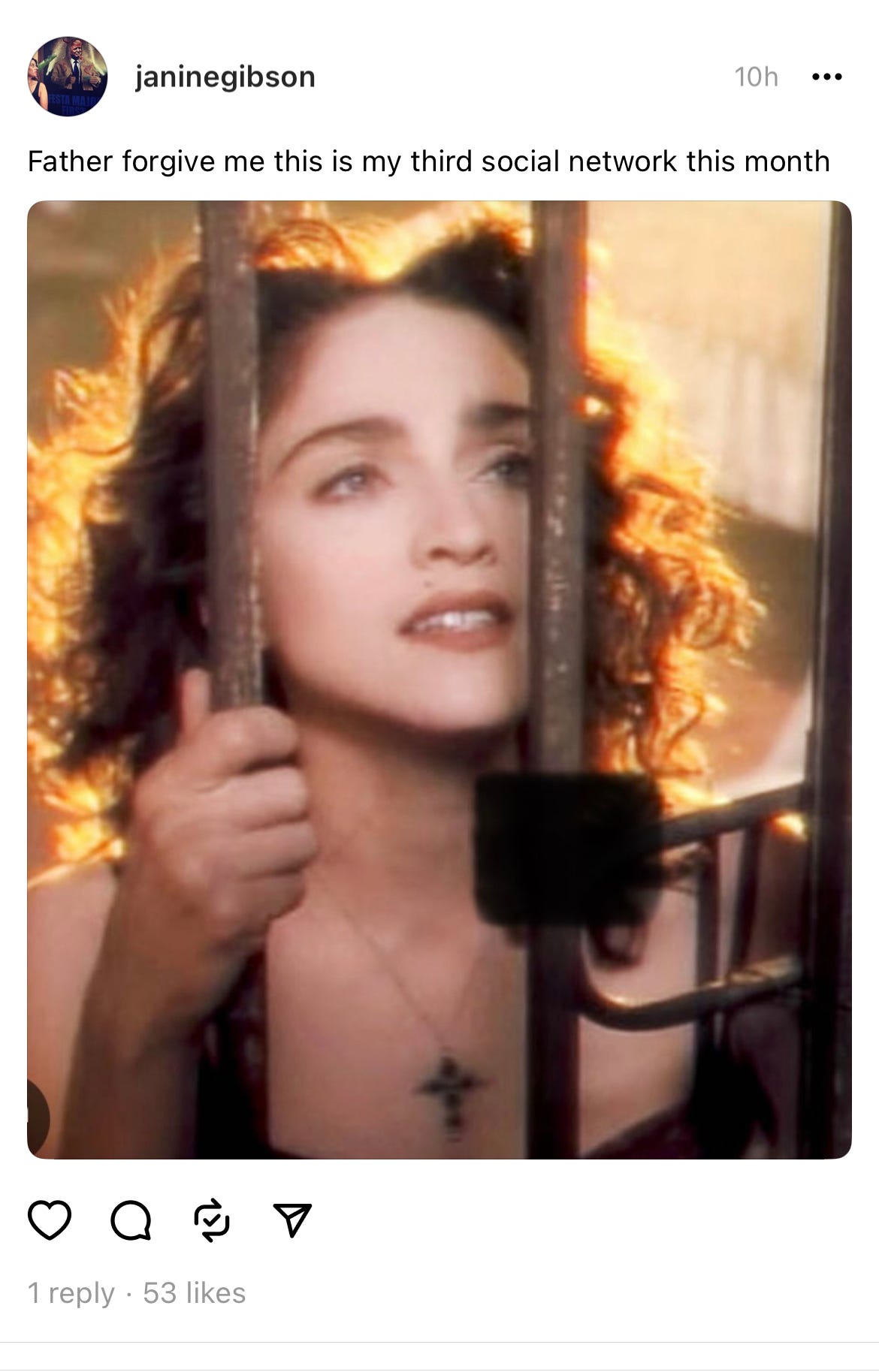Threads steals Twitter's most valuable resource
Plus chatbots are ranked very highly for creativity. Or else US college students are dim.

On Wednesday night UK time, working late, I installed the Threads app on my phone, found it had signed in to my personal Instagram account, and went to bed. At 7am on Thursday morning, when the Do Not Disturb setting turned off automatically, my Apple Watch started making occasional BOINGG noises. Usually those mean some sort of news story, so I dozed on. But the noises kept on coming, and eventually I thought something worth investigating must be happening. Turned out that Threads was sending a notification to my Watch every time someone started following me. And they were doing so with a surprising regularity and intensity.
So I opened the app in my befuddled state and took a look at what was going on. And there I saw something that I hadn’t seen for absolutely ages; for years and years, in fact. I scrolled and scrolled, and there was one emotion on show: people were happy. They were making jokes, laughing in text. The screen was full of joy.
One of the first I saw was this:
I think she was probably referring to Bluesky and Twitter as the other two. (If you don’t recognise the picture, it’s Madonna, in Like A Prayer.) And the reply:
If you don’t know who that is, it’s Deidre Barlow, the character from long-running TV soap Coronation St whose imprisonment for fraud in 1998 became a topic at Prime Minister’s Questions. (Never say we don’t take our TV seriously 🙄). But of course this is dissecting the frog. You laugh, which I did, or you don’t and scroll on.
It was like that all over the place. People were delighted to have somewhere new to use where everyone already seemed to be there. Apparently there were 30 million signups within the first few hours, and by the end of its first day there were 95 million posts. That’s a lot of happiness. Because Threads seems, despite its rudimentary state (no bookmarking, strange URL structure, no content search, algorithm-only timeline), to have all the things people want from Twitter, but without, well, being Twitter.
Needled by Threads
The response from Twitter has been hilarious: it sent a grumpy letter to Meta, with the accusation that there had been “systematic, willful, and unlawful misappropriation of Twitter’s trade secrets and other intellectual property.” Alex Spiro, Twitter’s lawyer, continued:
“Twitter intends to strictly enforce its intellectual property rights, and demands that Meta take immediate steps to stop using any Twitter trade secrets or other highly confidential information. Twitter reserves all rights, including, but not limited to, the right to seek both civil remedies and injunctive relief without further notice to prevent any further retention, disclosure, or use of its intellectual property by Meta.”
To which I hope Meta’s lawyers send back a letter saying HAHAHAHAHAHAAAAA. But this shows that Elon Musk is now fighting Mark Zuckerberg on three, count ‘em three, fronts.
1: The absurd cage fight. I’d say Zuckerberg is pretty certain to win that. And I’d also expect him to go at it with a ruthlessness that will shock Musk, and onlookers. Zuckerberg does not go into things to come second; he is an exceptionally determined person. He’ll probably stop short of breaking fingers or legs, but the odd opponent’s rib might be deemed fair game.
2. This legal flimflammery claiming misappropriation, if it ever comes to anything, rather than being a way of keeping Twitter’s lawyer off the golf course. I’d point out that Facebook/Meta/Instagram has been in the social network business for a loooong time (two years longer than Twitter) and has picked up some patents during that time, including one for a news feed based on people’s interests, and probably some method of inserting ads into said feed. I wouldn’t want to be Twitter’s lawyers contemplating that.
3. The battle for attention between Twitter and all the Meta properties. This is the one that’s properly dangerous to Twitter’s future. Consider: at the time of its sale, Elon Musk got a social network with perhaps 250 million DAUs (daily active users). That engagement has taken years to build up, but in the past few months it has seen plummeting advertising revenue (even while it has blocked third-party apps which didn’t show ads, and stuffed the timeline with more and more ads). Then last weekend the company was forced to limit how many tweets users could see; which is about the worst thing that a company depending on showing ads to people could do.
Now, something between 500m and 860m tweets are posted each day (tracking down a precise number is just a recursive maze). That’s about two or three tweets per day on average, though of course actual posting is heavily weighted to the top 10% of accounts, which put out 80% of tweets. Which means that Threads is already on course in terms of engagement (95m posts from 30m users is quite a result), and the only way is up: Instagram, don’t forget, has a billion users. Rather as Snapchat withered in the shadow of Instagram Stories, the potential for Threads to suck all the attention away from Twitter is quite real. There are news organisations on there (I found the Financial Times), and there are verified labels for those who want them which actually indicate you are who you say you are; a radical idea, I know.
Sure, the growth will slow, but it wouldn’t be surprising if Threads hits 300 million users in a month or so. And that’s allowing for a delay to a rollout in Europe over GDPR concerns.
Tick tock, Elon
The calculus is simple. If people who would normally be on Twitter are instead on Threads, those are lost opportunities to show them ads on Twitter. There aren’t yet any ads on Threads, but it wouldn’t surprise me to see them; but nor would I be surprised if they turned out to be surprisingly relevant and/or interesting, and offering the sort of thing that I end up buying. I’ve had that experience multiple times on Instagram, and that’s when using the profile there which is for my dog. By contrast everything I see on Twitter is either junk, irrelevant, or illegal to own in the UK because it constitutes a weapon. (Although, I continue to observe, lists do not get adverts. So if you built a list which consisted of all the people you follow, and pinned that to the top of your app/web page..?)
Twitter is in serious trouble now because attention is an inelastic resource. You, me, Elon Musk, the woman driving the bus, we all get precisely 24 hours of it to give per day. Some of that is lost to sleep (weep, Reed Hastings) but while you’re awake, it’s a fight. And Meta is really good at it. One day of 30 million users bitten out of Twitter might be tolerable; multiple months of 300 million users bitten out of Twitter will be intolerable. Because there won’t be anyone left.
Oh sure, that’s not actually true. There will always be people using Twitter, because they’ll like being able to aggravate other people, or dunk on people. Of course it’s early days on Threads, and too soon to say what sort of behaviours will emerge there. But its first day was like the biggest party you’d ever been to, and everyone was damn happy.
No wonder Elon Musk got his lawyer to send a fretful letter. In business, game knows game. And as I said, Mark Zuckerberg doesn’t go into anything to come second. Elon Musk, however, might have to start getting used to the feeling.
Glimpses of the AI tsunami
(Of the what? Read here.)
• AIs can match the top 1% of human thinkers on a standard test for creativity. (The Torrance Tests of Creative Thinking, since you ask.) Faintly worrying, though the comparator was 2,700 US college students, so who knows. Very good on fluency, apparently.
• Indian politician blames embarrassing tape on deepfakery. Except the properly embarrassing stuff wasn’t.
• Generative AI in games will create a copyright crisis. Or at least that’s the argument. I’d have thought the limitation (that it’s in-game) would stymie that, although you’d need to prevent wider sharing. Although - a question I return to repeatedly - are prompts copyrightable? (Surely yes, they’re created by a human.) And are they actionable? (Almost certainly not, in my view, even if the prompt leads to content that’s somehow infringing. But I’d love to see this argued out properly in a court.)
• How human translators are coping with competition from AI. By creating centaurs—humans allied to machines. Though one has to think that their days are numbered (as they admit in the piece). And I think that transcription services must be facing the Wil E Coyote moment.
• You can buy Social Warming in paperback, hardback or ebook via One World Publications, or order it through your friendly local bookstore. Or listen to me read it on Audible.
You could also sign up for The Overspill, a daily list of links with short extracts and brief commentary on things I find interesting in tech, science, medicine, politics and any other topic that takes my fancy.
• I’m the proposed Class Representative for a lawsuit against Google in the UK on behalf of publishers. If you sold open display ads in the UK after 2014, you might be a member of the class. Read more at Googleadclaim.co.uk. (Or see the press release.)
• Back next week! Or leave a comment here, or in the Substack chat, or Substack Notes, or write it in a letter and put it in a bottle so that The Police write a song about it after it falls through a wormhole and goes back in time.





It's going to be wait and see on Threads. It's one thing to get people to sign up, but another to get them to stay. Obviously Meta has an advantage, but so far I haven't heard anyone singing Threads' praises as a great place to be. I'm currently a Threads refusenik, though I was a Facebook refusenik too until a friend created an Ada Lovelace Day event there and I had to sign up to manage it. I suspect I'll eventually get forced on to Threads too, but I'll resent every second of it.
Wait, aren't we all supposed to boo and hiss about billionaire-owned social networks, and tout (toot?) Mastodon and the Fediverse nowadays? I can never keep up.
Anyway, I remember back when Twitter first started, how happy all the "influencers" were about it. How they rhapsodized about the people they'd connect with, the ease of use, the way their fan club seemed to hang on every little thing they tweeted. And how I'd get a lot of flak for not liking it, partly due to the rampant bullying and harassment - which was not consider a major issue at the time, since then it was almost all "punching down" by the most prominent influencers.
Zuckerberg is much better at a certain type of chattering-class politics than the Great Musk Satan. Maybe this is the "MySpace moment" for Twitter. But we're just going from one billionaire who doesn't seem to understand the social media business to another billionaire who knows it very well.